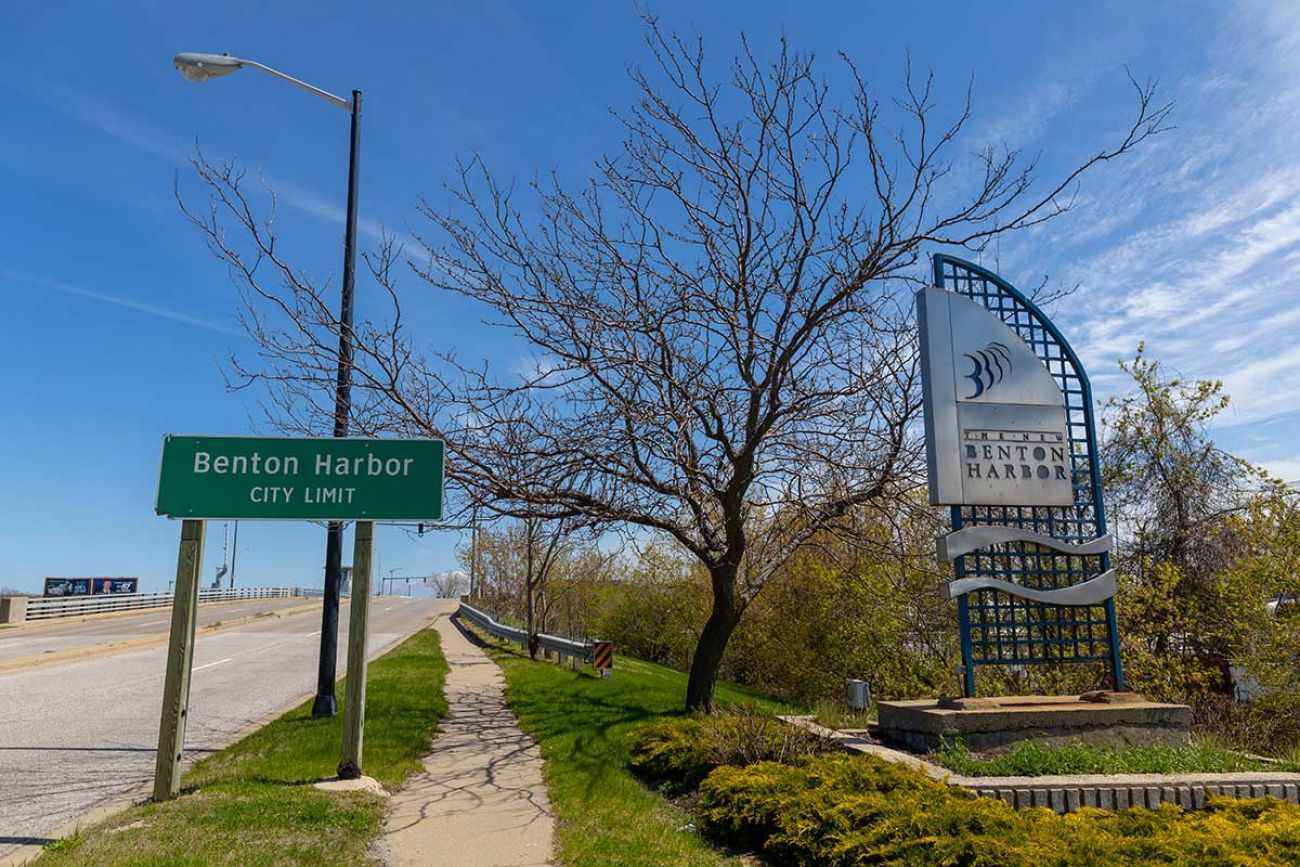Lower water lead levels a glimmer of good news for Benton Harbor

For the first time since 2018, lead levels in state-ordered samples of Benton Harbor’s water have dipped below the state regulatory threshold, test results released Wednesday show.
State environmental regulators say it’s an encouraging sign that chemicals designed to keep lead from leaching out of the pipes that deliver water into residents’ homes are working as intended.
Related stories:
- High costs, few customers: Benton Harbor water woes loom for Michigan cities
- Docs: Benton Harbor water response marked by delays, poor messaging
- In Benton Harbor, residents’ complaints of lead-tainted water carry echoes
But they caution that it changes nothing about Michigan’s newly-escalated response to the city’s three-year-long water crisis. Benton Harbor residents should keep drinking bottled water until further notice, and the state still wants to eliminate lead service lines from the city’s water system by spring 2023.
“There are actions underway in Benton Harbor that aren’t going to stop,” said Eric Oswald, director of the drinking water and environmental health unit of the Michigan Department of Environment, Great Lakes and Energy.
“The numbers are going in the right direction, but we still need more data.”
A study meant to identify the best possible corrosion control mixture for Benton Harbor is due in February. The state has faced criticism for selecting an anti-corrosion chemical mix of polyphosphate and orthophosphate without first studying its efficacy, but regulators say doing so would have left residents with no protection while regulators awaited study results.
So far, crews have replaced 397 lead service lines, or about 9 percent of the city’s estimated 4,322 lead-containing lines. The city is recruiting additional construction crews in hopes of replacing the rest by March 2023.
No amount of lead is safe to ingest, though Michigan water supplies are flagged for a violation when 10 percent or more of water samples collected test over 15 parts per billion. That threshold will drop to 12 parts per billion in 2025.
“Just because we're meeting that action level doesn't mean that the water is magically safe,” said Elin Betanzo, a water engineer and former EPA official who now runs the firm Safe Water Engineering. “Fifteen parts per billion is not a safe level.”
Benton Harbor’s latest round of results, released Wednesday, came in just under the threshold, at 15 parts per billion. That’s down from 24 parts per billion earlier this year. And none of the 63 samples analyzed from Benton Harbor homes this fall contained the astronomically-high results found in some past samples.
State officials collect both the first and fifth liter coming from a residential tap, and use the first liter as an indicator of any lead leaching from home faucet fixtures. The fifth liter is considered to be an indicator of any lead leaching from the city service lines that funnel water into the house.
The highest reading from Wednesday’s results, 48 parts per billion, came from a first-liter draw. The highest fifth-liter draw came in at 21 parts per billion.
Compare that to the most recent previous round of testing, in June, when one result came back at 889 parts per billion.
Benton Harbor Mayor Marcus Muhammad attributed those previous high results to improper testing protocol by volunteers who collected samples from improper locations, such as bathtub faucets.
That, he said, led to a “miscategorization” of the city as “the next Flint.”
“I have always rejected that statement,” he said, adding that “an asterisk should be by those numbers, and those homes should be retested.”
Oswald said the state is planning to allocate several hundred thousand dollars early next year to replace lead-containing water fixtures inside Benton Harbor homes.
The test results come as some water activists have raised concerns that questionable testing protocols may have skewed past rounds of testing, potentially artificially lowering or raising the city’s lead readings and making the crisis appear less severe.
Oswald disputed those claims. He said when faced with questionable samples, state officials have taken pains to overestimate lead levels rather than underestimate them.
“If anything’s skewing it, we’re trying to skew it to more conservative numbers, not to the lower numbers,” he said.
Oswald said the latest state-mandated sampling results join other evidence of declining lead levels in the city’s water, including voluntary testing in Benton Harbor homes, and U.S. Environmental Protection Agency samples taken this fall.
Preliminary results of EPA tests also indicate that the filters health officials previously distributed to many Benton Harbor homes are effective at removing lead from water. Oswald said none of those samples have detected more than 1 part per billion, an indication that “the filters are doing exactly what they’re advertised to do.”
Full results of the filter study are expected by February. Until then, regulators still advise residents to drink bottled water.
While Benton Harbor works to eliminate lead pipes from its distribution system, it must grapple with deeper existential questions about how it will overcome chronic funding constraints that have left the water plant in disrepair.
Millions of dollars of investment are needed, and it’s unclear where Benton Harbor will get the money. Federal officials have ordered the city to at least consider consolidating with a nearby water provider — a move Oswald said could lower residents’ water rates while delivering more consistently clean water.
But it’s a tough sell in Benton Harbor, where some local officials fear it would make the city beholden to the neighboring white communities whose exodus from Benton Harbor helped cause the water system’s budget crisis.
“We need restorative justice, where the policies and procedures are not punitive,” Muhammad said.
Benton Harbor’s next round of water samples are due in June. Meanwhile, the state is reviewing the state Safe Drinking Water Act line-by-line, in hopes of identifying regulatory changes that could prevent future crises of this magnitude.
One possibility: Ordering corrosion control as the default in cities with lots of lead-containing pipes in their water system, rather than waiting for evidence that the toxic metal is leaching into residents’ drinking water.
Michigan Environment Watch
Michigan Environment Watch examines how public policy, industry, and other factors interact with the state’s trove of natural resources.
- See full coverage
- Subscribe
- Share tips and questions with Bridge environment reporter Kelly House
Michigan Environment Watch is made possible by generous financial support from:
Our generous Environment Watch underwriters encourage Bridge Michigan readers to also support civic journalism by becoming Bridge members. Please consider joining today.
See what new members are saying about why they donated to Bridge Michigan:
- “In order for this information to be accurate and unbiased it must be underwritten by its readers, not by special interests.” - Larry S.
- “Not many other media sources report on the topics Bridge does.” - Susan B.
- “Your journalism is outstanding and rare these days.” - Mark S.
If you want to ensure the future of nonpartisan, nonprofit Michigan journalism, please become a member today. You, too, will be asked why you donated and maybe we'll feature your quote next time!






